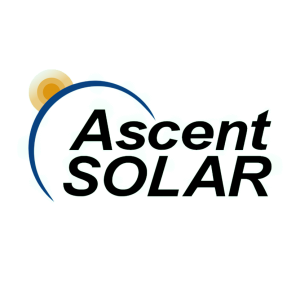Ascent Solar Begins Advocacy Outreach to Brief Private Sector Space Activities Interagency Steering Group Members on Advantages of Thin-Film Solar PV in Space
THORNTON, Colo., Jan. 30, 2024 (GLOBE NEWSWIRE) -- Ascent Solar Technologies, Inc. (“Ascent” or the “Company”) (Nasdaq: ASTI), a U.S. innovator in the design and manufacturing of featherweight, flexible thin-film photovoltaic (PV) solutions, today announced it has initiated advocacy outreach to members of the recently-formed Private Sector Space Activities Interagency Steering Group as part of the White House’s United States Novel Space Activities Authorization and Supervision Framework.
The Group is tasked with creating an authorization and supervision framework for novel space activities. Within its mission statement, the framework states its intent to collaborate with members of the commercial space industry to advance national objectives. Among those objectives include addressing the hazard of space debris, a primary feature of Ascent’s thin-film PV technology, as it has the unique ability to continue functioning after sustaining damage from impacts with orbital debris.
The Ascent team is focusing its lobbying efforts on engaging key individuals within the US Departments of Commerce, Transportation, Defense, Energy, Homeland Security, Interior, and State, as well as the FCC and NASA. The conversations will primarily focus on technology, as well as commercially viable solutions and practical implementation and standards, particularly within power generation subsystems that see the largest cross-sectional area of satellites and other spacecraft. These subsystems are a primary driver in conjunction event probabilities and consequence, two areas where Ascent’s thin-film technology can have major efficiency and cost benefits.
“Ascent is a leader in the proliferation of thin-film solar modules in space environments, and we look forward to detailing our industry expertise to the Group,” said Paul Warley, CEO of Ascent Solar Technologies. “Upon engagement, Ascent seeks to work closely with several government departments on projects that will further establish thin-film solar technology as a viable, efficient, and resilient energy solution for satellites and other space vehicles.”
The targeted advocacy aims to inform White House Group members on several components relevant to their goals, including:
Space Sustainability/Orbital Debris
- Means to increase space architecture resiliency and mitigate/minimize creation of orbital debris
- Retractable/re-rollable arrays to protect from threats/hazards (Space weather, ie Carrington event)
- Longer lived spacecraft enabled by self-annealing solar arrays with minimal degradation
Industry Standards & Best Practices
- Realistic & attainable goals aligned with international efforts such as ESA Zero Debris Initiative
- Standards for inter-configurability/changeability, modularity, & upgradability of spacecraft
- Potential minimum operational safety standards on orbit
- How government furnished equipment (or required equivalent) could be included as part of licenses to in operate in congested/contested orbits with higher likelihood of conjunction
- Benefits of orbital restrictions for rigid and brittle components
- Methods for responsible and cost-effective rapid end of life servicing
Foster Competitiveness of Advanced Energy & In-Space Manufacturing Industry
- Provide the power and voltages that on orbit manufacturing requires at scale
- Enable Space Based Solar Power & Transmitting/Receiving
- Mass/Material efficient solar arrays that are able to be produced at scale domestically
International Relations
- Conjunction avoidance/mitigation strategies and tactics
- Ways to fostering commerce while enabling safe operations from other sovereignties participating in space activities
National Security
- Responsive, resilient dual use solar products
ABOUT ASCENT SOLAR TECHNOLOGIES, INC.
Backed by 40 years of R&D, 15 years of manufacturing experience, numerous awards, and a comprehensive IP and patent portfolio, Ascent Solar Technologies, Inc. is a leading provider of innovative, high-performance, flexible thin-film solar panels for use in environments where mass, performance, reliability, and resilience matter. Ascent’s photovoltaic (PV) modules have been deployed on space missions, multiple airborne vehicles, agrivoltaic installations, in industrial/commercial construction as well as an extensive range of consumer goods, revolutionizing the use cases and environments for solar power. Ascent Solar’s research and development center and 4.5-MW nameplate production facility is in Thornton, Colorado. To learn more, visit https://www.ascentsolar.com or follow the Company on LinkedIn and X (formerly Twitter).
FORWARD-LOOKING STATEMENTS
Statements in this press release that are not statements of historical or current fact constitute "forward-looking statements" including statements about the financing transaction, our business strategy, and the potential uses of the proceeds from the transaction. Such forward-looking statements involve known and unknown risks, uncertainties and other unknown factors that could cause the company's actual operating results to be materially different from any historical results or from any future results expressed or implied by such forward-looking statements. We have based these forward-looking statements on our current assumptions, expectations, and projections about future events. In addition to statements that explicitly describe these risks and uncertainties, readers are urged to consider statements that contain terms such as “will,” "believes," "belief," "expects," "expect," "intends," "intend," "anticipate," "anticipates," "plans," "plan," to be uncertain and forward-looking. No information in this press release should be construed as any indication whatsoever of our future revenues, stock price, or results of operations. The forward-looking statements contained herein are also subject generally to other risks and uncertainties that are described from time to time in the company's filings with the Securities and Exchange Commission including those discussed under the heading “Risk Factors” in our most recently filed reports on Forms 10-K and 10-Q.
MEDIA CONTACT
Spencer Herrmann
FischTank PR
ascent@fischtankpr.com








